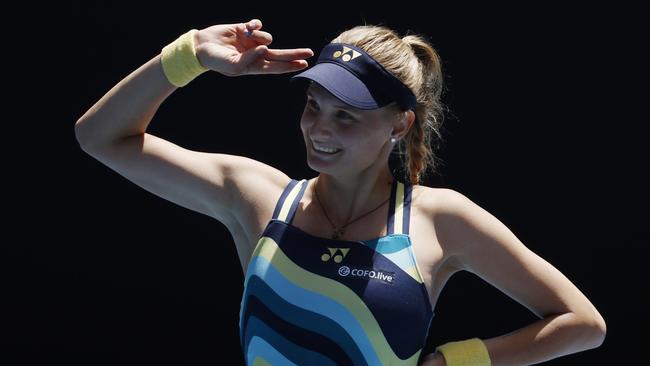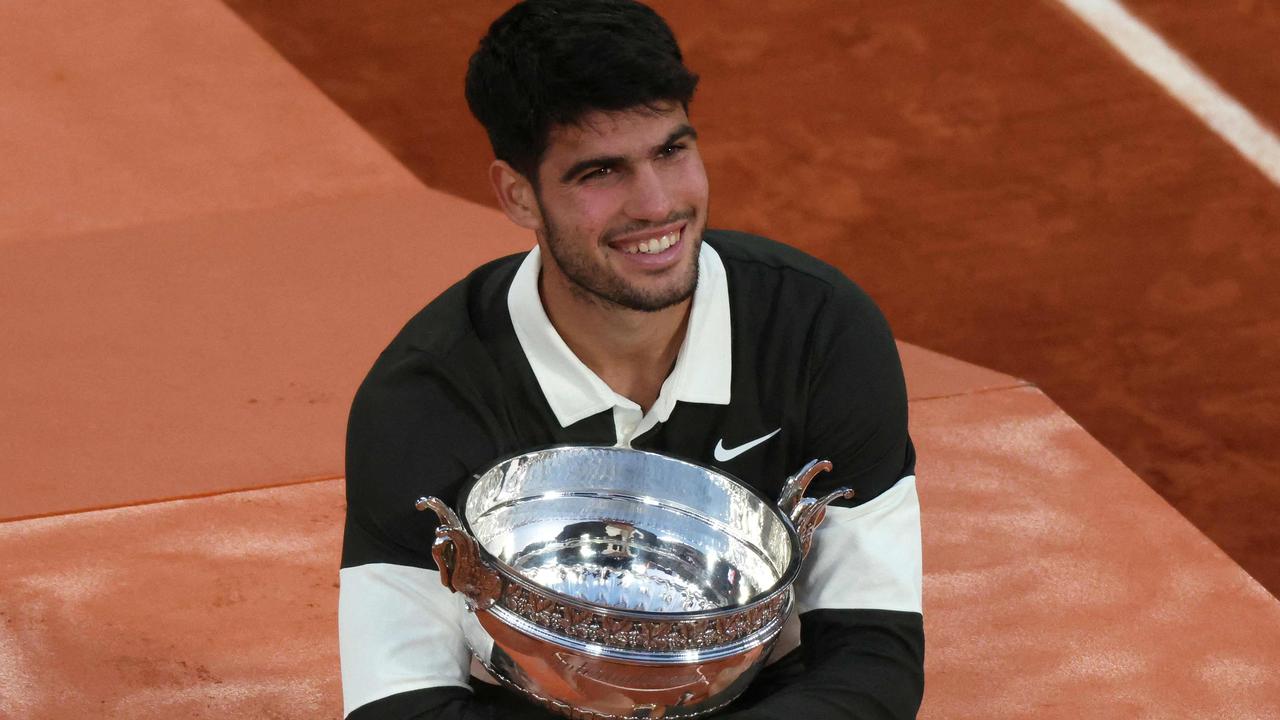‘You’re not going to like my answers’ – Ukraine’s Yastremska marches into Open quarter-finals
Two Ukrainian women are into the quarter-finals. They’re refusing to shake hands with Russian or Belarusian players. By way of explanation, Dayana Yastremska says, ‘The rocket arrived on my grandmother’s house’.

The 119-year-old Australian Open could be heading for a couple of firsts. A Ukrainian winner. And a final that ends without a handshake.
Ukraine’s women are competing with a fierce national pride, refusing to shake hands with Russians and Belarussians, and making no apologies for the end to tradition.
Dayana Yastremska wouldn’t even be photographed alongside Victoria Azarenka inside Rod Laver Arena on Monday.
The post-match handshake was never going to happen. Yastremska’s intense distaste for the nationality of her Belarusian opponent was palpable, as she joined countrywoman Marta Kostyuk in the quarter-finals at Melbourne Park.
“Playing against the Belarusian player? If I’m going to start talking about it, I think you’re not going to like my answers,” Yastremska said, after stunning Azarenka 7-6 (8/6), 6-4.
“I’m just going to say, I want to skip this question. I think, like, if you’re asking this question, I’m sure you know how it is for us, for Ukrainians to play against Russians and Belarussians.
“I’m sure you know. So I don’t think it’s a good way to ask about this question.”
Yastremska was competing in the Brisbane International earlier this month, when her grandmother’s apartment was bombed in Ukraine.
“The war has affected us a lot,” she said. “You cannot go home like you want to, like it was before. You always read the news. You always see the videos. For example, when I was in Brisbane, the rocket arrived on my grandmother’s house.
“It’s tough emotionally to play. And people are starting to forget about what is going on.
“I don’t really want to talk about it, but just in general, it’s tough to play. After two years, you get to manage how to deal with all the emotions and with everything that is going on inside.”
Yastremska has had a barren couple of years on tour. She said part of the reason was trying to live up to expectations after an all-conquering junior career – and trying to win for Ukraine people since Russia’s invasion in February, 2022.
“I was putting a lot of pressure on myself in different ways,” she said. “In the way that it’s the war and I have to show better results, you know, for Ukraine. I wasn’t playing just for myself in the beginning. Then I was putting pressure on myself that before, when I was younger, I was much better than I am right now.
“I’ve decided that from this year, no more pressure. No more. Just be the way you are and we’ll how it’s going to go.”
Yastremska avoided the customary post-match handshake by holding up her racquet to tell Azarenka, not happening. She stood in the middle of RLA and cupped her hands in the shape of a love heart. Then she placed her palms together, prayer-like.
Her outfit was predominantly blue and gold, the national colours of Ukraine. She received a rapturous ovation. When Azarenka was questioned on the obvious animosity when she has a Ukrainian opponent, she replied: “Next.”
A third Ukrainian player, Elina Svitolina, sobbed when she retired at 0-3 on Monday against Czech Republic’s Linda Noskova, due to back spasms. Yastremska faces Noskova on Wednesday.
Kostyuk will meet America’s US Open champion Coco Gauff on Tuesday.
She believes it isn’t enough for Russians and Belarussians to be playing under a neutral flag at Melbourne Park.
She reckons they should be banned altogether. “The war is still there,” “People are still dying every day. I still don’t understand what these players are doing here.”
Kostyuk and Belarus’s defending champion Aryna Sabalenka are in the same half of the draw. They could end up meeting in the semi-finals.
There’s a few sets of circumstances to be played out, but if we end up with Yastremska versus Sabalenka in the decider, there will no pleasantries before the match, no pleasantries during the match and none whatsoever during the normally pleasant post-match presentation ceremony.
A Ukrainian has never won a tennis major. She’ll be an instant national hero if she prevails at one of the world’s most globally prestigious events.




To join the conversation, please log in. Don't have an account? Register
Join the conversation, you are commenting as Logout